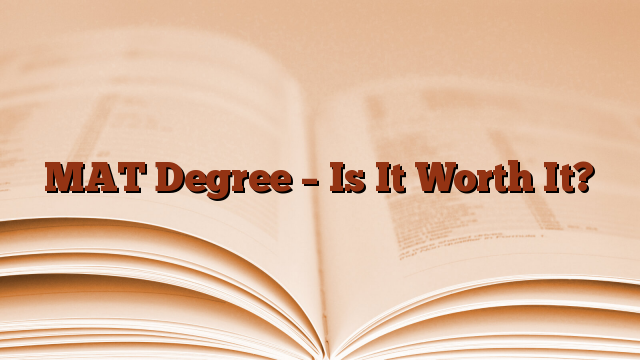Currently, a MAT degree or Master of Arts in Teaching will improve your prospects as a teacher – increase your chances of leadership positions in your school and most likely increase your salary to at least eleven thousand dollars. Most educational universities offer programs that allow you to earn your teaching license and MAT at the same time, allowing you to kill two birds with one stone and meet state requirements while making yourself more marketable. The MAT degree is designed to broaden and deepen teachers’ knowledge and didactic skills. MAT programs are designed to help new or experienced teachers improve their teaching skills, advance their careers and refine their educators, and update teachers on advances in technology, theory, and methodology in education.
So what’s the problem?
Studies show no correlation between advanced degrees and student performance. The current discussion about educational reform is aimed at linking teacher pay to performance and not to certificates. Research professor Dan Goldhaber explains that research going back to 1997 showed that students taught by teachers with master’s degrees do not progress any better than students taught by teachers without advanced degrees.
It is argued that the teacher training colleges do not focus enough on experiential teaching, which affects the success of prospective teachers. Some argue that it is not enough to say, “The more education, the better the teacher.”
Patrick Welsh, an English teacher at TC Williams High School in Alexandria, Virginia, believes certification has become an “absurd process” that plagues schools that have to follow rules they don’t improve on. He lists personal examples he has seen of uncredited teachers or administrators who have done better at their jobs than others have done with them. He calls today’s system “a charade that confuses attending mind-numbing educational courses with being a ‘highly qualified’ teacher and ends up filling the schools with tenured mediocrity that the children do not deserve.”
Katherine Merseth, director of teacher education at the Harvard Graduate School of Education, has even stated that of the country’s 1,300 graduate teacher education programs, only about 100 are doing their job competently and the rest may “close tomorrow.” Historian Diane Ravitch called the teachers’ coursework “the stale curriculum,” and author Elizabeth Green reports that the programs focus too much on broader instructional theories than what she and many others believe is more important — experiential training.
Despite this, teachers and administrators continue to champion the MAT, often agreeing that the incentives make it worth the investment and because they believe it can make a difference. “We believe that college preparation is key to acquiring the knowledge and skills we value,” said C. Kent McGuire, dean of Temple University.
“We look closely at the institutions that have awarded such degrees because not all advanced degrees are created equal,” McGuire continued. One such preference is that MAT graduates have studied at research institutions.
McGuire also notes that it is important to distinguish between the credentials used in selecting and hiring a teacher and the information or criteria used to reward performance. “Training and experience factors by themselves turn out to be fairly weak predictors of effectiveness,” he said.
In addition, better teacher training has proved its worth in other countries. Finland’s school reforms began in 1963 as an attempt to get the economy moving again. In 1979, reforms required teachers to earn their master’s degree in theory and practice at one of their eight state universities at state expense. This decision and the selectivity of these schools helped make teaching a respected profession in Finland. Now Finland’s education system is one of the best in the world.
The real question is: what makes a good teacher? Welsh might agree that some teachers have a talent for communicating and connecting with their students and connecting their students with the subject they are teaching. Education cannot teach talent; If someone wasn’t born to be a teacher or doesn’t enjoy teaching, then a MAT may not be for them. But if it’s their calling, then more education can only improve their performance by increasing their pedagogical knowledge and confidence. A MAT degree doesn’t make a teacher a good teacher, but it can help a good teacher become a great teacher. So is it worth it? The answer depends on your own vision of what the future holds for you and whether you are willing to put in the effort to make your experience worthwhile.
Knowledge is an opportunity to expand creative and innovative thinking and always work to improve. A master’s or doctorate in education may not automatically make a teacher better, but it can give them the opportunity and knowledge to work toward their goals.
Thanks to Janel N Spencer | #MAT #Degree #Worth

Leave a Reply